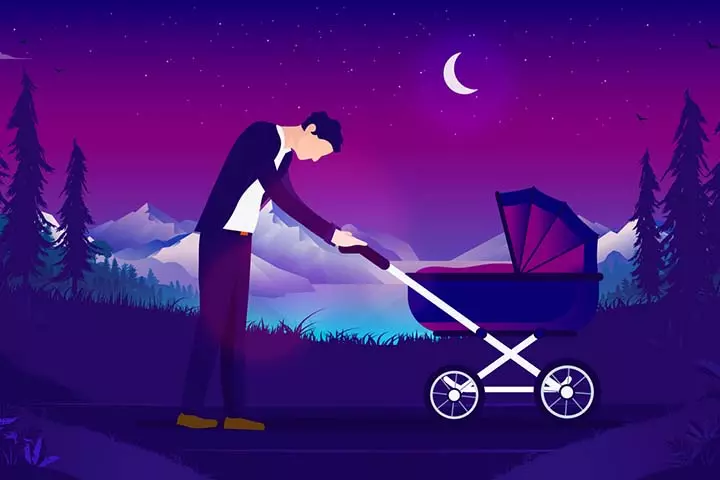
Shutterstock
You must have heard single parenting is on the rise. Therefore, a lot of discussions keep going around single father vs. single mother. For instance, around 14% of children in the world live with single parents (1). Approximately 86% of them in the US are managed by mothers (2), while the number of single fathers also increases. Also, 19 million minor children live with single mothers, and 3 million live with single fathers (3). These figures reflect a large disparity in how single parents are acknowledged in reality. Read this post to get a better insight into gender-biased expectations and extend your support to single mothers and fathers.
Key Pointers
- Single parenting is difficult irrespective of gender, yet there’s a stark difference in issues that parents from either gender have to face.
- Single moms are usually judged harshly for their children’s behavior.
- Single dads are presumed to be incapable of doing simple things like changing diapers.
- Providing parents with adequate support can make their lives easier.
Difference Between Single Father vs. Single Mother
The Organisation of Economic Co-operation and Development (OECD) has defined single parents as those living with at least one biological or adopted child and not with their partners for varied reasons such as separation, divorce, widowed, single, never married, or not living with a partner (4). Studies indicate that more than 50% of kids born to cohabiting couples and 20% of children born to married couples will experience a parental breakup or divorce by the age of nine. 32% of children have also been recorded as living with an unmarried parent (8).
While single parenting is difficult irrespective of gender, there are some glaring differences that single parents of either gender have to face.
Single Mother Issues
Single mothers face a lot of problems, and society has certain presumed viewpoints. Here are some of them.
1. Involvement in school activities
Single mothers often feel scrutinized on how much time and effort they devote towards their children. In most cases, a female parent has to work to run the household, which makes them miss certain crucial moments such as parent-teacher meetings, sports events, or school events, which can create a lot of pressure.
2. Social stigma
Single mothers may be faced with social stigma associated with their parenting choices. The everyday hassles they face while trying to fit into the society may make them feel judged regarding their ability to raise children alone. This can lead to feelings of isolation and inadequacy, making it challenging for them to build a supportive social network.
3. Working overtime
Although narrow, the existing gender pay gap at workplaces (5) and being the singular source of income in the family may pose a challenge for mothers when paying bills. Thus, affording childcare costs and medical costs, which are more than half their annual income in some states (6), becomes more difficult. This forces women to work overtime to improve their financial situation, taking them away from their children and family.
4. Incomplete education
Many single mothers may be teenagers who are yet to obtain a high school degree (6). They may be unprepared to take on the additional responsibility of a child, shifting their focus towards sustaining child care. This may hinder their chances of obtaining further education, which, in turn, hampers them from taking up high-paying jobs or living a high quality life.
5. Inadequate personal time
Since early childhood, women are taught to act responsibly and take it upon themselves to serve their family’s welfare without breaks. This learning influences a single mother’s perception of childcare, making her feel criticized for doing even small things for herself. For instance, a mother may think the school teachers may think lowly of her if her children are late for school since she slept in. Thus, single mothers tend to feel compelled to take up the slack without any support and be perfect at all times.
Single Father Issues
Here are some positive and negative presumptions of single fathers in society.
1. Expectations of less involvement

The contributions of a single father towards his children’s welfare are often praised. However, this is done in such a way that he feels that even small efforts, such as ensuring the child eats breakfast or goes to school on time, are an impossible task for a father. This may further be reinforced by questions of whether the children’s mother is absent, making the man question his survival skills and his abilities as a father.
2. Emotional support needs
Single parenting comes with its struggles, which can be emotionally draining on the parent. Single fathers may struggle with emotional expression as they may not have received social encouragement or parental guidance on the matter in their younger years. As men, fathers are also taught that it is their responsibility to hold themselves together through all odds so that their children see them as a pillar of strength. Such false societal perceptions and expectations may work to diminish their parenting capabilities.
3. Expectations of incompetence
Societal expectations often assume that single fathers are less capable in caregiving roles, while single mothers are held to unrealistically high standards. In either case, parents are expected to be incompetent in giving proper care to their children. However, such social assumption, along with the high praise or harsh criticism given to the fathers on simple things such as changing diapers or dressing a baby, makes them feel destined to fail.
4. Reservations in other parents

If a single father’s children have female friends, their parents are less likely to send the girls over to the single father’s house due to a general lack of trust. This can make it hard for single dads to host or support parties and play dates for their children.
5. Continual defaults
Studies indicate that children from single parent families are more likely to engage in high risk behaviors as they are exposed to parental conflicts, separations, poverty, substance use, mental illnesses, violence, constant relocation, and social isolation (9). In such cases of emotional and behavioral problems in children, school authorities and other parents may prefer to contact the mother. However, in single father families, this preference may cause distress to both the children and the parent as the father may not receive proper information on their children or guidance on coping with such behaviors.
 Point to consider
Point to considerHow To Support Single Parents?
Single parents are the sole providers of their families and face difficulties irrespective of gender. However, there are some things we can do to support them.
1. Avail resources for single parents
Single parents of any gender have to overcome several difficulties, that require the availability of resources and people. Single mothers have a greater risk of mortality, poor physical and mental health, higher rates of psychological distress, and lower socioeconomic status than married or partnered women (1). Studies on single fathers reveal a similar association, single fathers were found to have poor lifestyle practices and habits that led to increased health complications, psychological symptoms, hospital admissions, and increased risk of mortality (10).
While several resources are available for single parents, they are underutilized due to lack of support. However, this may be remedied with help from family and friends who aid in childcare. Grandparents or siblings of the parent may be able to offer daycare for the child while the single parent goes off to work. These services may also be provided by any willing close friends or neighbors who can be trusted. Also, take assistance from the children’s other parent or any of their trusted family members if they are offering to assist in co-parenting the child.
 Quick tip
Quick tip2. Encourage community engagement
Introduce single parents to local support groups and parenting programs so that they foster relationships among single parents and help them share experiences and resources. Such groups can help provide the child and parent with friendly neighbours who can step in at times of need. These may also provide single parents with legal assistance and child protection and welfare rights knowledge. Schools and community care centers can host events that provide the necessary knowledge and awareness on safe child care practices, personal or menstrual hygiene, gentle parenting, positive discipline, and handling teenagers. This can be a community-driven approach to enable single parents to provide for their families and reduce the sense of isolation.
Communities can also recognize the challenges specific to single mothers, such as inability to breastfeed in public places, and single fathers, such as lack of diaper changing stations in public restrooms for men. They can initiate discussions on these and urge the people in authority to have suitable support systems for single parents.
3. Promote equality in childcare

Many parents raise boys to become breadwinners and girls to take care of the household and children in the future. This is a major setback in situations where a partner cannot or does not contribute to tasks. However, this can be addressed through schools and other educational centers.
Educational and childcare centers can impress upon their students that tasks have no gender and every gender can do any task efficiently. It is at school that children learn that it is not shameful for a woman to not want children or a man to take care of the house. Teachers can make sure that children are aware that they can make their own choices when they grow up.
Schools can also teach parents on ways to start promoting equality in boys and girls in personal care, childcare, and household chores. Inclusivity can be exemplified through gender neutral preschool activities, non-binary play toys, and equal co-curricular or sports participation in school teams.
4. Acknowledge the challenges both genders face
Single parents have to pick up the work of the other partner and do it all within the same time. Single dads and moms have to devote equal time towards managing their work and home. They may have to put in extra effort to gain work-life balance, especially if they are unfamiliar with working or household duties. Some parents may also constantly push themselves into filling the shoes of the other parent in the child’s life. For example, fathers may feel worried about how they will fill the mother’s shoes. John Broadway, son of a single father, recalls how his dad was an amazing single parent and never let him feel the absence of a mother. He says, “Beyond the logistical and financial complications of being a single parent, my dad struggled with an aspect that I’m sure any single parent can identify with: how do I provide my children the emotional support/guidance that typically comes from a mother. My dad has often lamented how much this struggle weighed on him (i).”
Apart from these, they have to explain to their children the absence of their other parent. If there has been a sticky divorce or a bitter fight for child custody, children are likely to be resentful of either parent. The parent has to take care of the children’s mental and physical health as well. In this case, single parents may find it a bit easier if people around them tend to praise them for little things rather than being scrutinized at every point.
Frequently Asked Questions
1. Is a single father better than a single mother?
According to Pew Research, single fathers are financially more stable and, thus, in a better condition to take care of their children than single mothers. The annual income of a single father may be around $40,000, which is far more than a single mother’s annual income of $26,000 (7).
2. What are the disadvantages of being a single parent?
The disadvantages of being a single parent may be financial instability, excess workload leading to lack of time for kids, inability to discipline children effectively, excessive attachment to children, and relationship problems.
3. How do single fathers and single mothers typically cope with the stress and demands of parenting alone?
Both single fathers and single mothers often rely on support networks to help them cope which can include family members, friends, support groups, or online communities. Creating a structured routine, delegating the possible work, and prioritizing self care can help single parents manage their time more efficiently and reduce stress.
Parenting is a life-long commitment that can be fulfilled efficiently by even a single parent, irrespective of gender. However, the debate on the efficacy of care provided by a single father vs. a single mother is unfaltering. Not everyone is a single parent by choice. Some take to single parenting because they are either a widow or widower. Sadly, single mothers may tend to be judged by society, while single fathers are usually questioned on their ability to take care of a child as efficiently as the mother. But a sole parent is a role model for children. Children look up to them with love and admiration because they sacrifice their own comfort to single-handedly raise a child. Acknowledging the challenges both genders face while parenting and supporting them can make their day-to-day lives easier. Extending fundamental support at work and home by offering to babysit the child and facilitating work from home can aid in the process.
Infographic: Common Problems Faced By Single Parents
Although single parenting is more on the rise recently, it might present a few challenges for the parent and the child. The infographic below details the common issues a single mother or father may have while raising their child(ren). Illustration: Momjunction Design Team
Illustration: Single Father vs. Single Mother: 8 Common Differences

Image: Stable Diffusion/MomJunction Design Team
Personal Experience: Source
MomJunction articles include first-hand experiences to provide you with better insights through real-life narratives. Here are the sources of personal accounts referenced in this article.
i. Shout out to all the single fathers: Mine is amazing.https://johnbroadway.medium.com/shout-out-to-all-the-single-fathers-638b57c44a78
References
1. Single fathers: neglected, growing, and important, The Lancet (2018)
2. The Hard Truth: Single Moms vs Single Dads, Single Parent Project
3. More Children Live With Just Their Fathers Than a Decade Ago, United States Census Bureau (2017)
4. Families are changing, Organisation of Economic Co-operation and Development (2011)
5. A Hegewisch and Z Barsi; The Gender Wage Gap: 2019 Earnings Differences by Race and Ethnicity, Institute for Women’s Policy Research (2020)
6. Kasey J. Eickmeyer, American Children’s Family Structure: Single-Parent Families, Bowling Green State University (2017)
7. The Rise of Single Fathers; Pew Research Centre
8. About one-third of U.S. children are living with an unmarried parent; Pew Research Centre
9. Child Well-Being in Single-Parent Families; The Annie E. Casey Foundation
10. Shefaly Shorey and Travis Lanz-Brian Pereira; Parenting experiences of single fathers: A meta-synthesis; Family process (2023)
Community Experiences
Join the conversation and become a part of our nurturing community! Share your stories, experiences, and insights to connect with fellow parents.
Read full bio of Ashley Baldwin
Read full bio of Shikha Thakur
Read full bio of Akshay Nair
Read full bio of N Pravenchandra Singh



















